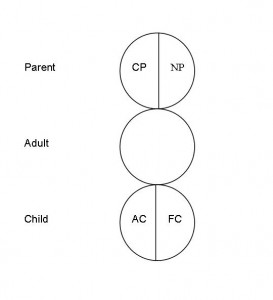 There are many books out there on therapy, self-help, counselling and personal change so how do you know which ones are worth reading and which ones are best avoided? Personal recommendations count for a lot and I often get asked what books to read. Some of the following five books have been recommended to me and I have happened upon others by luck, chance or good fortune. I see it as my turn to pass on those recommendations, or that luck, to you.
There are many books out there on therapy, self-help, counselling and personal change so how do you know which ones are worth reading and which ones are best avoided? Personal recommendations count for a lot and I often get asked what books to read. Some of the following five books have been recommended to me and I have happened upon others by luck, chance or good fortune. I see it as my turn to pass on those recommendations, or that luck, to you.
The five books listed here have changed my life for the better. That sounds dramatic but it’s true. I’ll explain how each one has changed my life during the brief review of each book.
If you click on the book picture it will take you straight to amazon if you wish to have a look at it there. I will declare upfront that I have an affiliate link set up but the link is really only there to speed things up for you and to allow me to display a graphic of the book on my site without breaching any kind of copyright.
Bor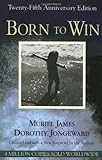 n to Win: Transactional Analysis with Gestalt Experiments This is the first book I ever read on Transactional Analysis and as such it holds a special place in my heart. It was the start of my Transactional Analysis education and it contributed greatly to me becoming a TA psychotherapist. My first therapist recommended it to me and he also introduced the concepts contained within the book to me during my therapy sessions with him. The whole process led to a paradigm shift in the way that I saw the world and stresses, anxieties and jealousies that I had had since I was a child melted away. Having therapy had such a profound impact on my life that I chose to train as a therapist from that moment on. I think this was also so I could better understand for myself just how therapy works and how I could use it to help other people’s lives change for the better.
n to Win: Transactional Analysis with Gestalt Experiments This is the first book I ever read on Transactional Analysis and as such it holds a special place in my heart. It was the start of my Transactional Analysis education and it contributed greatly to me becoming a TA psychotherapist. My first therapist recommended it to me and he also introduced the concepts contained within the book to me during my therapy sessions with him. The whole process led to a paradigm shift in the way that I saw the world and stresses, anxieties and jealousies that I had had since I was a child melted away. Having therapy had such a profound impact on my life that I chose to train as a therapist from that moment on. I think this was also so I could better understand for myself just how therapy works and how I could use it to help other people’s lives change for the better.
Born to win is a well written book with clear explanations of TA theory. I still remember reading it and having those “ahhh, that’s why I do that!” moments. It’s less textbooky than TA today and there are plenty of exercises in there to encourage you to try the theory out for yourself. If you are having TA psychotherapy then understanding the theory does help. I think it sometimes speeds the achievement of your goals up because it provides a framework to hang ideas on to. This would be a great book to start that learning process off.
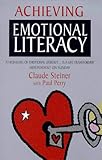 Achieving Emotional Literacy by Claude Steiner. This is a special book for me because it helped me understand how to become more emotionally literate and it explains stroke theory brilliantly (a stroke is a unit of recognition, like “hello” or a wave or a kick up the backside). I have already reviewed this book more fully in a previous post so if you want to read a pretty detailed account of this book then go read that post here. Suffice to say I love this book and I see Steiner as a bit of a guru. He’s kind enough to give it away free too so now you have no excuse not to read it!
Achieving Emotional Literacy by Claude Steiner. This is a special book for me because it helped me understand how to become more emotionally literate and it explains stroke theory brilliantly (a stroke is a unit of recognition, like “hello” or a wave or a kick up the backside). I have already reviewed this book more fully in a previous post so if you want to read a pretty detailed account of this book then go read that post here. Suffice to say I love this book and I see Steiner as a bit of a guru. He’s kind enough to give it away free too so now you have no excuse not to read it!
The Happ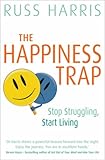 iness Trap: Stop Struggling, Start Living by Russ Harris. Speaking of guru’s, whilst being trained in TA I met a great guy trained in CBT and Acceptance and Commitment therapist working with substance abusers in Manchester. He introduced me to ACT and it fit brilliantly with my interests in TA, Buddhist philosophy and mindfulness techniques. The Happiness trap by Russ Harris was the first book I read on the subject, and of all the ACT books I have now read, most definitely the easiest to read.
iness Trap: Stop Struggling, Start Living by Russ Harris. Speaking of guru’s, whilst being trained in TA I met a great guy trained in CBT and Acceptance and Commitment therapist working with substance abusers in Manchester. He introduced me to ACT and it fit brilliantly with my interests in TA, Buddhist philosophy and mindfulness techniques. The Happiness trap by Russ Harris was the first book I read on the subject, and of all the ACT books I have now read, most definitely the easiest to read.
The book explains how you can use Acceptance and Commitment Therapy to reduce stress, anxiety and depression. It makes really good sense and gives practical tips on managing your negative thoughts, reducing your urges to carry out unproductive behaviour and setting values based goals that you can achieve now rather than results based ones that only give temporary fixes of satisfaction. ACT techniques encourage the giving up of struggle and the acceptance of all of our feelings. This book is so well written you don’t need to have any therapy knowledge to get loads out of it.
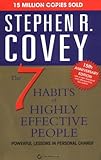 The 7 Habits of Highly Effective People by Stephen Covey. This is a book that I stumbled upon initially in audiobook form. I liked it so much I ended up buying a paper copy too so I could browse more easily through it. I deliberately mention it after “The happiness Trap” because it has many of same principles in common. Some of the best work I have ever done in creating a strong team and a vision within that team was stimulated from reading this book. It’s not a therapy book, it guides you through the process of deciding what you want in life (values based in the same way as ACT), prioritizing what really matters and explaining how you can get there.
The 7 Habits of Highly Effective People by Stephen Covey. This is a book that I stumbled upon initially in audiobook form. I liked it so much I ended up buying a paper copy too so I could browse more easily through it. I deliberately mention it after “The happiness Trap” because it has many of same principles in common. Some of the best work I have ever done in creating a strong team and a vision within that team was stimulated from reading this book. It’s not a therapy book, it guides you through the process of deciding what you want in life (values based in the same way as ACT), prioritizing what really matters and explaining how you can get there.
Getting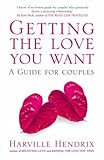 the Love You Want: A Guide for Couples by Harville Hendrix. Once more I have to thank my first therapist for recommending this book to me. It’s important because it has changed the way I view how a relationship should be and Imago therapy itself has given me a lot of great techniques I can use as a couples therapist with struggling couples. In my opinion, it is the book to read if you are having relationship difficulties and you want to understand why. It suggests new ways to communicate with your partner and also gives good exercises you can do together to strengthen your relationship. I go into more detail about the ideas behind Imago therapy in my post “How Imago Couples Therapy Can Transform Your Relationship” So check that out for more information.
the Love You Want: A Guide for Couples by Harville Hendrix. Once more I have to thank my first therapist for recommending this book to me. It’s important because it has changed the way I view how a relationship should be and Imago therapy itself has given me a lot of great techniques I can use as a couples therapist with struggling couples. In my opinion, it is the book to read if you are having relationship difficulties and you want to understand why. It suggests new ways to communicate with your partner and also gives good exercises you can do together to strengthen your relationship. I go into more detail about the ideas behind Imago therapy in my post “How Imago Couples Therapy Can Transform Your Relationship” So check that out for more information.
So there they are – five books that have changed my life and can change yours if you let them. Happy reading!
Have you read any of these books? What did you think of them? What books have changed your life? Please let me know in the comment section below.


